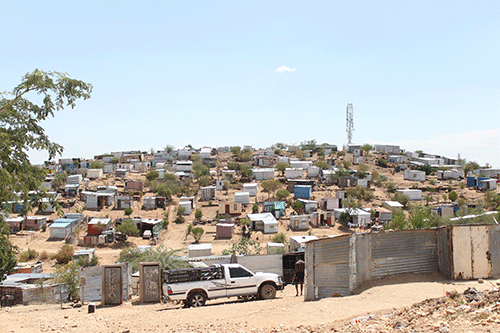With more than a quarter of all households in Namibia consisting of shacks and informal settlements which accommodate close to a million Namibians, the pressing demand for affordable housing presents both a challenge and an opportunity for the domestic construction industry. As such, government policies and initiatives are crucial in supporting the overwhelmed housing sector.
In its latest analysis of Namibia’s building statistics, stock brokerage Simonis Storm (SS) last week noted that actions which boost infrastructure development, promote affordable housing projects, and encourage sustainable building practices are vital for the industry’s long-term health.
During the tabling of the national budget at the end of February, finance and public enterprises minister Iipumbu Shiimi announced measures aimed at accelerating the implementation of the approved National Housing Policy. For this reason, he allocated N$700 million in the 2024/25 budget for upgrading informal settlements, extensive land servicing, and other programmes to enhance access to housing opportunities nationwide.
In its most recent housing report, SS stated that in a move to enhance access to housing, adjustments will be made to transfer duties and stamp duties’ brackets, in line with inflation.
“Consequently, the exemption level will be raised from N$600 000 to N$1.1 million. Additionally, the threshold to trigger the 8% transfer duty rate will be increased to N$3.15 million, effective from FY2024/25. With these measures in place, it is anticipated that there will be a resurgence in local construction activity and an increase in building plan engagements in 2024,” the SS report stated.
Meanwhile, SS further pointed out that in February 2024, the City of Windhoek (CoW) approved 192 building plans, marking a significant increase from 76 building plans approved in January 2024.
“This translates to a monthly growth rate of 152.6% month-on-month (m/m) and 8.5% year-on-year (y/y) increase, compared to February 2023. The total value of these approvals reached N$190.7 million in February 2024, substantially higher than the N$53.8 million recorded in January 2024. Of the plans approved in February 2024, 123 were for additions, 36 for new residential houses, 24 for wall constructions, and five for commercial developments.
Also, for February 2024, the City of Windhoek recorded the receipt of 186 building plans, representing an uptick from the 122 plans submitted in January 2024, but a decline from the 202 plans submitted in the same month of the previous year.
In February 2024, 31 building plans were completed in Windhoek, with a combined value of N$22.9 million. The bulk of these completed projects were situated in the Otjomuise and Wanaheda neighbourhoods. Among these completed projects, residential houses were the most common, followed by additions to existing structures.
Furthermore, the Municipality of Swakopmund received building plans estimated at a total value of N$42.9 billion between 15 January 2024 and 14 February 2024. Additionally, the municipality disclosed various building fees during this period, including over N$578 000 in building application fees, just over N$5 000 in building compliance fees, and more than N$57 000 in building fines issued.
In February 2024, the Municipality of Swakopmund approved 50 building plans with a total value of N$125.3 million. Among these approvals, 40 were for new residential buildings, six for institutions, two for industrial buildings, and two for commercial buildings. The Swakopmund municipality recorded an increase in completed projects, with 28 projects completed in February 2024, compared to only six in January 2024. The total value of these completed projects amounted to N$27.1 million.
Meanwhile, the urban and rural development ministry recently stated that government has built just over 8 600 houses during the last five years, while the national housing backlog is estimated at around 300 000. This is on average just over 1 700 houses constructed per annum.
In fact, since 1990, Government has built more than 81 000 houses through cooperative programmes such the Build Together Programme (BTP), the Informal Settlement Upgrading and the National Housing Enterprise (NHE).



